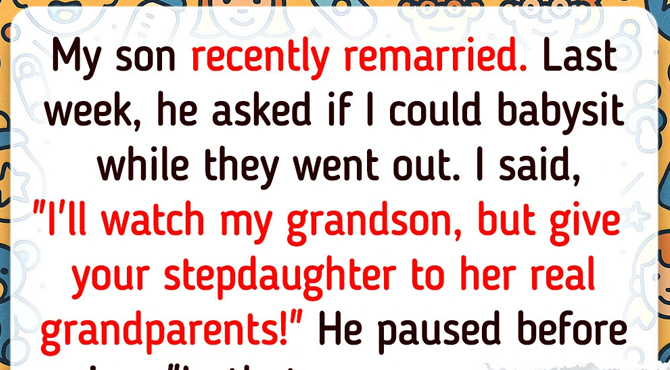When blended families come together, emotions often get complicated. One grandmother shared her story with us, admitting she refused to babysit her son’s stepdaughter. The fallout left her entire family in chaos, and now she’s questioning whether she went too far. We invite you to read this shocking confession.
Here’s what she shared:
Hello,
I never imagined I’d be the villain in my own family, but that’s exactly how I feel right now. I’m devastated, and I need to share this story because I don’t know if I did something unforgivable.
My son, Nathan, remarried a year ago. His new wife, Marissa, has a daughter from her late husband. Her name is Keira, she’s nine, and she’s a sweet kid, I won’t deny that. But she’s not mine. I already have a grandson, Caleb, who feels like the center of my world. With Keira, it’s different. I’ve tried, but I’ve never felt that instinctive bond.
Last weekend, Nathan called and asked if I could babysit while he and Marissa had a night out. I said yes, picturing an evening with Caleb. But when they arrived at my house, Keira came in too, carrying a backpack. Nathan kissed me on the cheek and said, “Thanks for watching them, Mom.”
I froze. I looked at Keira, then at Caleb, and something inside me snapped. I blurted out, “Nathan, I don’t mind keeping Caleb, but isn’t Keira better off with her own grandparents?”
Keira’s little smile disappeared instantly. Marissa’s face went pale, and Nathan’s expression turned into pure disappointment. He told Keira to grab her bag, picked up Caleb, and said to me in a low, shaking voice: “If you can’t be Grandma to both, then maybe you don’t deserve to be Grandma to anyone.”
They walked out. No yelling, no fight, just silence and slammed doors.
The fallout was brutal. Marissa texted me later, saying Keira cried herself to sleep, asking why I didn’t love her. Nathan called me “cold-hearted.” Even my sister said she wouldn’t want me near her kids if I could reject one so openly. It feels like the whole family has turned against me.
Bright Side, I keep replaying the moment in my head. Keira’s little face. Nathan’s words. I feel sick with guilt, but at the same time, I can’t help thinking I didn’t choose this child. I raised my kids, I poured myself into being a mother, and now a grandmother to Caleb. Do I really have to pretend the bond is the same with someone else’s daughter?
Am I selfish for setting boundaries, or heartless for saying out loud what most people would keep to themselves?
I honestly don’t know if I’ve ruined my relationship with my son forever. And I don’t know if Keira will ever look at me without remembering that moment.
Am I a monster… or just brutally honest?
Thank you very much for reading.
Thank you so much for sharing your story with us.
We know it’s not easy to open up about something so personal, and we truly value your honesty. Here are some suggestions that might help you navigate this painful moment and maybe start healing the cracks in your family.
- Flip the roles for one evening. Invite Keira over alone and treat her the way you naturally treat Caleb. Then pay attention to how it feels. Sometimes, just living the “what if” helps you see the gap between what you think and what you do.
- Break the ice with an unusual gesture. Send both kids a silly “Grandma’s challenge”, like baking a cake together or having a drawing contest. It doesn’t erase what happened, but it creates a shared memory that isn’t about the argument.
- Lean into brutal honesty, but with kindness. Call Nathan and admit, “I messed up. I don’t know how to love her the same way, but I want to try.” Owning the discomfort instead of pretending it doesn’t exist can open doors.
- Ask for a small inclusion, not full responsibility. Suggest activities like picking them up from school once a week, or sharing Sunday lunch. Limited, consistent moments are easier to commit to than overnight babysitting.
- Involve Marissa respectfully. Ask her: “What would make Keira feel more accepted by me?” It shows humility and also transfers some agency to the girl’s mother, which may reduce her defensiveness.
- Choose words carefully going forward. Even if you don’t feel grandmotherly, avoid phrases like “real grandkid.” Replace them with neutral ones, like “both kids,” “the children,” “the family.” Language shifts perception over time.
This story leaves us with a painful question: is love something we owe equally to every child who enters our family, or is it natural to feel more attached to our own blood? Did this grandmother simply speak a hard truth, or did she cross an unforgivable line by wounding a child’s heart? What do you think? Share your thoughts, we’d love to read how you see it.
